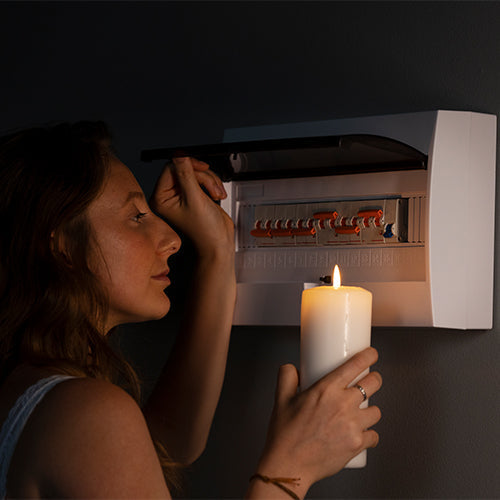Power outages can strike at any time, leaving homes and businesses in the dark. Whether caused by severe weather events or unexpected equipment failures, being prepared for a blackout is crucial to ensure safety and minimise disruption. This guide provides essential tips on how to prepare for power outages at home, including what to do with kids, the elderly, and those with medical devices, as well as the best portable generator solutions.
Essential Supplies for a Power Outage
Having a well-stocked emergency kit is critical for power outage preparedness. Essential items for your checklist include:
- Water: At least one gallon per person per day for a minimum of three days
- Non-perishable food: Canned goods, dry foods, and snacks that require no cooking
- First aid kit: Medical supplies, prescription medications, and special-needs items
- Lighting: Flashlights, battery-powered lanterns, and extra batteries
- Communication: Battery-operated radio to stay informed
- Other essentials: Manual can opener, coolers, blankets, important documents
Safety Measures and Home Preparation
Install carbon monoxide detectors with battery backup on every level of your home. Practice operating your garage door manually in case of power loss. Keep your car's fuel tank at least half full, as gas stations may be closed during outages. To protect electronics from potential surges when power is restored, use surge protectors.
Food safety is crucial during a blackout. Keep refrigerator and freezer doors closed to maintain cold temperatures. A full freezer can keep food safe for about 48 hours if unopened. Monitor food temperatures closely.
To prevent fire hazards, turn off and unplug appliances and electronics. Avoid using gas stoves, ovens, or grills to heat your home. Use flashlights or battery-powered lanterns instead of candles.
Generator Solutions for Power Outages
A reliable generator, like those from Gentrax, can provide much-needed power during an outage. Gentrax offers a range of portable generators to suit various needs and budgets, from the compact 800W gsi-xhax to the powerful 6.6kW gs-6500ie. These generators provide pure sine wave output, ensuring the safe operation of sensitive electronics like laptops and smartphones.
When choosing a generator, consider factors such as power needs (both starting and running watts), fuel type, noise level, and features like remote start and eco-mode for fuel efficiency.
Always operate generators outdoors in a well-ventilated area. Proper generator safety should be at the forefront of mind to avoid carbon monoxide poisoning. If connecting a generator directly to your home's wiring, have a licensed electrician install a transfer switch to prevent dangerous backfeeding.
Alternative Power Sources and Staying Informed
In addition to generators, consider alternative power sources like solar panels with battery storage or portable power stations. Non-electric options like battery-operated flashlights, lanterns, and radios can also help navigate an outage.
Stay informed by monitoring weather reports and official announcements. Have a communication plan with family and an out-of-town contact. By taking these proactive steps and having reliable backup power from a Gentrax generator, you can be well-prepared to handle any power outage that comes your way.
